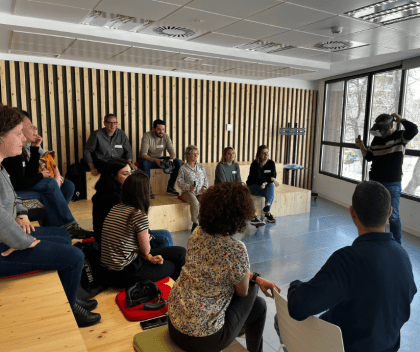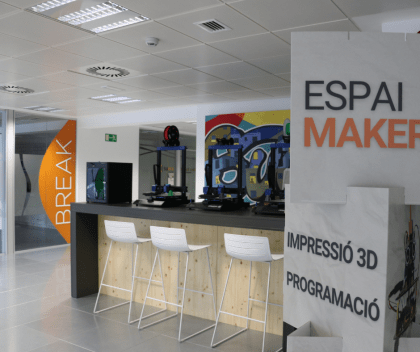A Spanish social co-op is embracing innovation in the delivery of its health and care services, through the use of tech such as robotics, immersive technology and telemedicine.
Suara Cooperativa delivers 284 different services for around 40,000 people throughout their lives, from early childhood through to elderly care.
Headquartered in Barcelona, Suara operates in Spain and Chile, employing 4,749 workers, of whom 1700 are members.
Along with the co-operative values and principles, Suara highlights four core values in its work: approachability, participation, social responsibility and innovation.
Suara’s director of innovation, Jordi Picas, explains that this value has been at the heart of Suara since it was born from the merger of three existing co-ops in 2008.
Related: Social care for the people it’s supposed to serve
Since then Suara has embarked on a journey of change, not just investing in innovation, but supporting its people to live this value in their work.
“We want everybody in the co-operative to have the mentality to be innovative, and for innovation to be a part of our day-to-day,” says Picas.

To this end, Suara launched its laboratory of social innovation in 2016, a space dedicated to developing new methodologies based around design thinking. In this space, workers are trained in these methodologies, collaborate with startups and take part in hackathons to come up with innovative solutions to emerging challenges.
In 2020, Suara joined the European Network of Living Labs, a group of over 480 real-life “experimentation environments” that bring together business, government, academia and citizens to co-create, prototype, test and scale innovations of benefit to all stakeholders.
Located in Barcelona’s 22@ technology district, Suara’s living lab spans 1300 square metres and hosts several spaces for different types of innovation work to take place.
The lab’s Coolthinkers Space focuses Suara employees on agile methodologies and design thinking to address social challenges, alongside dedicated training and coworking spaces.
A Makers Space houses equipment for 3D printing, programming and robotics, while Suara’s Immersive Reality Room is a space that offers the use of immersive technology to support physical and mental wellbeing. A partnership with Catalan start-up Broomx, the room is available for community use beyond the co-operative.
The lab is also home to the Centre for Independent Living (CVI), a facility that simulates the domestic environment equipped with different homecare technologies. The space is used to assess the needs of people with disabilities, offer advice regarding different adaptations that can be made in the home, and to train workers.
Related: Worker co-op Animorph wins funding to develop mental health tech
The development of its lab, and the approach taken by Suara when it comes to innovation has led to a number of projects leveraging different technologies to deliver its services.
In the area of elderly care, Suara has developed a number of initiatives. Its Connected Homes project equips homes with technology such as voice devices, smartwatches and sensors to form a cohesive home support system to enable older people to stay safe and independent in their homes. Another project, Casal Online, uses video call technology shared through home TV sets to deliver live programmes one might find in a social centre, such as workshops, group exercises, cultural activities and games.

Most recently, Suara has launched a number of pilots to test the use of robotics in elderly care, both in the home and in residential centres. One of these pilots, which has been running since last April, is called the Temi robot, developed through Suara’s innovation lab in collaboration with tech company the Saltó Group and the Institute of Robotics and Industrial Informatics of the Polytechnic University of Catalonia.
Temi is able to issue reminders to people about medical appointments or medications they need to take, connect them with their relatives or friends through video calls, and also includes warning systems to prevent or detect falls.
Other projects include Doctomatic, a telemedicine platform for preventing and remotely managing chronic diseases using artificial intelligence, and Accexible, an alert system that uses voice analysis to detect conditions such as depression, Alzheimer’s and Parkinson’s disease.
Suara has also looked to technology to support its colleagues. Benestarum is a digital platform developed during the pandemic, in response to the emotional stress workers were experiencing at the time. Suara created Benestarum to offer workers both psychological and physiotherapeutic virtual counselling, then rolled it out for other organisations to use. Benestarum now also offers nutrition and finance advice, as well as opportunities for group sessions and training.
Embedding this value of innovation at Suara has required a significant culture change. “It was a challenge,” says Picas. But, he adds, it was Suara’s value of participation that made this change possible.
“People in the co-operative are really engaged, they like to participate, and they want to know [what is happening],” says Picas.
“We need to communicate, not [just] what we do, [but] why we do this…people must understand why we start investing in this innovation and in technology. So everything we do, we try to explain very clearly”.
Picas explains that, whereas there was scepticism at first, Suara is now at a point where employees are suggesting pilot projects themselves.
“For us, the best way to introduce new things in the co-operative, is to bring people in to participate, not at the end, but in the design. When designing something, you put the co-operative, the workers, the members, the citizens, in this process.
“Ten years ago [people said], ‘you are crazy thinking about robots and technology and immersive reality’. Now, people really think that could be part of the solution.”

